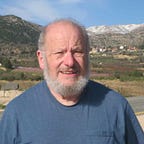The Threat of Nuclear Annihilation
If Vladimir Putin does not come to his senses, we are doomed.
No one can win a nuclear war. Once the first bomb explodes, civilization will be gone within days if not hours. The problem is simple: if a nation has nuclear weapons and it or any of its allies is attacked with a nuclear weapon, retaliation in kind is irresistible. It doesn’t matter whether that nation is Russia, the United States, Israel, Pakistan, or China. It’s like a nuclear reaction at the geopolitical level; once it starts, there’s no stopping it.
With the advent of nuclear submarines, the possibility of destroying an opponent’s ability to strike back disappeared. Once a nuclear war starts, the outcome is inevitable: a global bath of radioactivity that will exterminate life on earth. There is no defense. The outcome cannot be avoided. Fleeing into space will not avert the tragedy.
I find it incredible that national leaders fail to see this. That failure can only be accounted for by a strange unwillingness to ask the critical question over and over: What Happens Next? I cannot understand how Vladimir Putin, who is now threatening to use nuclear weapons, can fail to see that if he follows through on that threat, he personally and all of Russia are doomed.
Back in the 1960’s the physicist Herman Kahn at the Rand Corporation, a government-sponsored think tank, contemplated these matters. He wrote several books, including “Thinking About The Unthinkable”. He thought that a sufficiently extensive civil defense effort might save us. He did not anticipate how powerful the technology of annihilation would become.
The only way out, and it is a slim chance, is for all the nuclear powers to decommission, but not necessarily destroy, their nuclear arsenals. Expecting them to destroy those arsenals is probably asking too much. Decommissioning those arsenals will force a long delay in the decision to deploy them and allow time for the actors to come to their senses.
